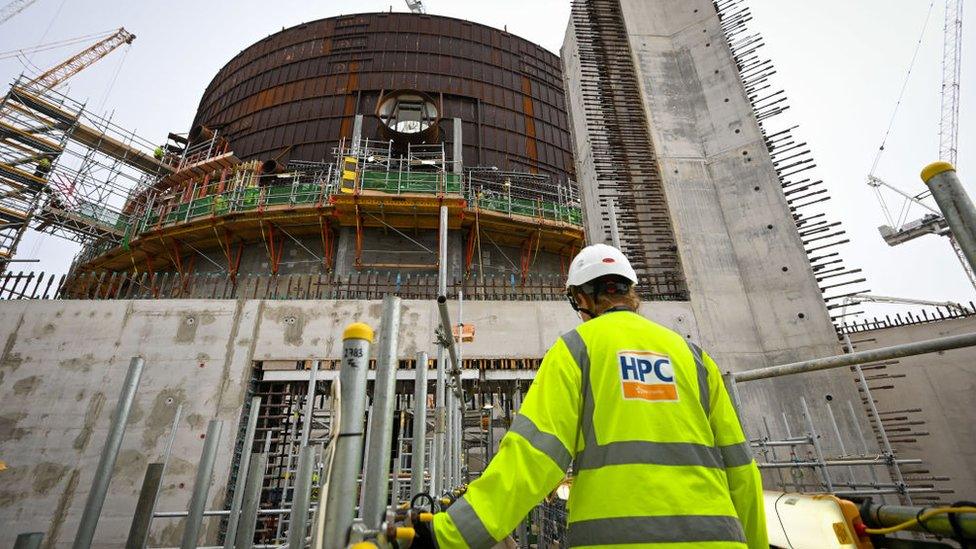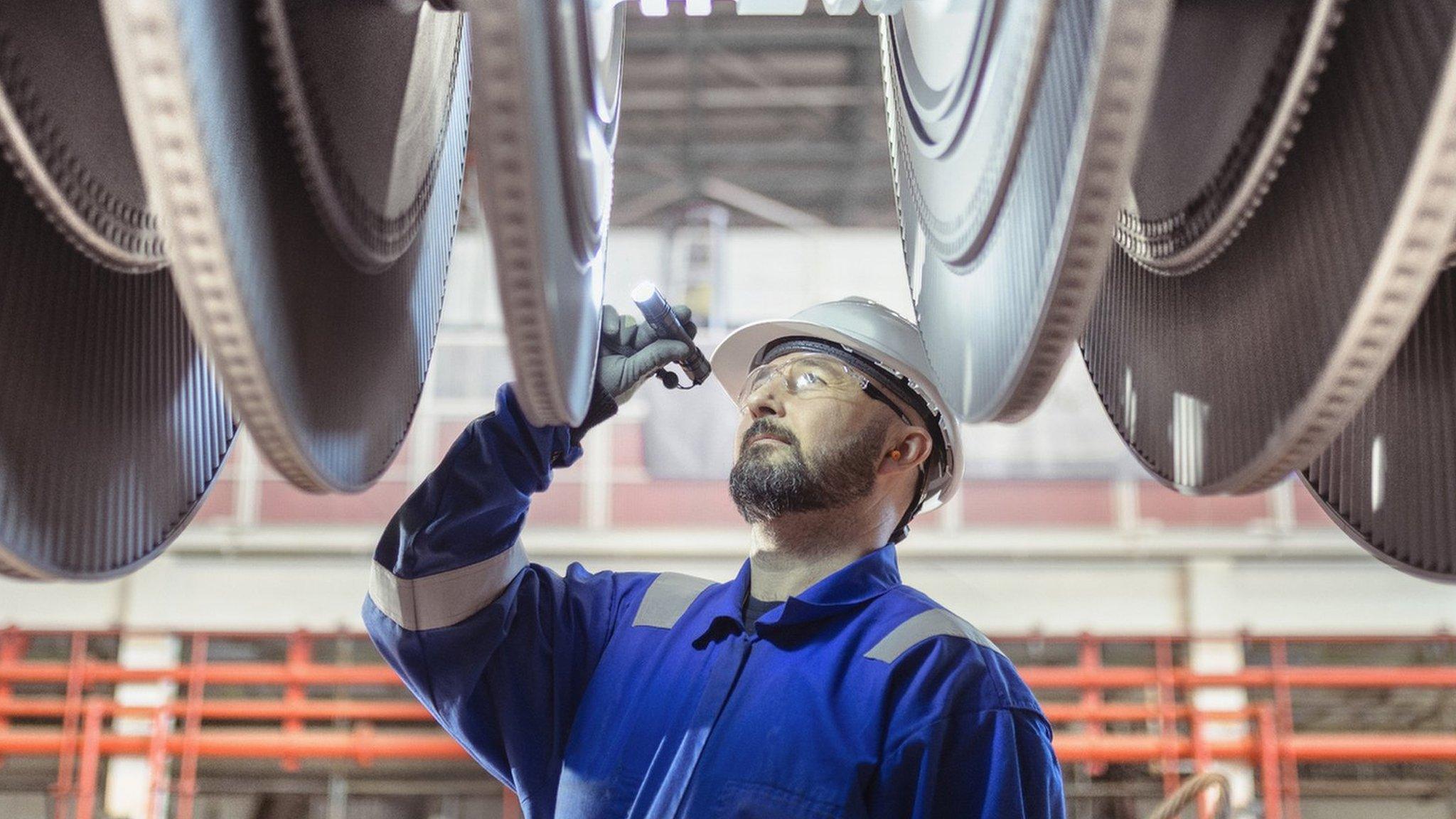UK’s nuclear power push will add to energy bills, ministers say
- Published
- comments

Hinkley Point C is one of up to eight new nuclear power stations and the first to be built in 20 years
The government's efforts to build new nuclear power plants will increase household energy costs, it has said.
A new reactor will "add at most a few pounds a year to typical household energy bills during the early stages of construction," officials said.
But they claimed households would pay less than £1 a month extra on average over the whole construction period.
It comes after Kwasi Kwarteng told the BBC there might be a "small effect" on bills under a new funding model.
The business secretary said "nothing should be taken off the table" to ease pressures on the cost of living, including a windfall tax on excess profits of oil and gas companies.
The BBC spoke to Mr Kwarteng as he visited north Wales, where the government has pledged to build a new nuclear power station at Wylfa on Anglesey.
A previous plan for a new nuclear power station at Wylfa collapsed in 2020 but last month Prime Minister Boris Johnson said he wanted to revive the idea "as fast as possible".
Investing in nuclear power is one of the key focuses of the government's energy strategy, released in April.
The government plans to reduce the UK's reliance on oil and gas by investing in alternative sources of energy, including nuclear, wind and hydrogen power.
Watch: Nuclear projects may affect bills - Kwasi Kwarteng exclusively tells the BBC
The strategy contains an ambition to deliver up to eight new nuclear reactors before 2030, including two at Sizewell in Suffolk.
The government wants nuclear to supply 24 gigawatts (GW) of electricity by 2050 - about 25% of the UK's predicted energy demand.
'Nuclear is back'
Mr Kwarteng said he thought investing in nuclear was "part of the solution" to the UK's energy needs.
He said "nuclear is back on the table" because it provides more decarbonised power and a sustainable energy source.
But building new nuclear power plants can be vastly more expensive than renewables and can take decades to build.
A new law means new nuclear reactors can be funded by adding a small levy to people's bills during their construction.


Companies have previously pulled out of plans to build new nuclear reactors - including the one at Wylfa on Anglesey.
These reactors take a lot of time and money to build, so the concern has often been around the financial risk.
The government feel the way around this is to raise funds through levies on people's bills, so that risk is shared with the consumer.
It argues it would only add a few pounds a year to energy bills during the construction phase.
But the concern is many nuclear projects - such as Hinkley - have run well over their initial budget and timescale.
Ministers say they want to place their "big bet" on nuclear but it's just part of the plan.
They want to expand offshore wind farms, and North Sea oil and gas expansion.
They have offered cheaper energy bills for people who live near new onshore wind farms - but not for nuclear.

The government says this will lead to savings for consumers in the long run, as developers can have more money upfront, and are less likely to take out loans.
But critics argue this shifts the risk of building new reactors on to the consumer, without knowing how long projects will take or how much they will cost.
When asked whether putting bills up in the short term was worth the political gamble, Mr Kwarteng said: "Absolutely. People here really want to see new investment, jobs, opportunity for their kids and their community."
The government's own public attitudes research, external shows while 86% of people support renewable energy, public support is lower for nuclear energy (37%).
Nuclear plants are extremely expensive to build, although the overall cost is comparable to other forms of power.
Hinkley C - the newest of the UK's planned nuclear power stations - is expected to cost £22-26bn.


When asked if he thought the public supported investment in nuclear, the business secretary suggested "nuclear's more popular now than it's been for a while".
He said there were two reasons why people wanted to see more nuclear power - "security of supply here in the UK" and "what experts call firm power".
"What that means is, if you look at renewables the sun doesn't always shine, and the wind doesn't always blow," he said. "The great thing about nuclear power is that it's continuous power."
In a community such as Wylfa, he said, "there's actually broad public support".
"Now the nuclear power won't be everywhere in the UK, it will only be on sites where there is a history, a tradition."
A mixed reception
The government's plan for a new nuclear power station at Wylfa has split opinion among local people.
Jo Fosbrook, a local holiday business owner, said she reluctantly accepted investing in nuclear power was necessary.
"You can't say that 'I don't want nuclear power', because what else are you going to have?" she said. "What are you going to say to everybody, have a candle on in the eve instead?"
But Emlyn Richards, a retired Methodist minister, was less keen on the idea, expressing a preference for renewable sources of energy.
"Anglesey is noted for its wind," he said. "Why don't they harness that and turn it to power?"
He said Wylfa was the "most beautiful spot on the island". "I don't want them to spoil that beauty for the generation that's coming after us," he added.
Anglesey hasn't had a functional nuclear power station for nearly seven years, but is that about to change?
As part of its plan, the government opened a £120m fund designed to stimulate the development of nuclear technologies on Friday.
As well as large, traditional nuclear reactors, the government is also supporting the development of small nuclear reactors (SMRs), which are smaller and can be assembled in factories - making for a simpler construction project.
Tom Samson, CEO of Rolls Royce SMR, which wants to build some in the UK, told the BBC the company hoped to finance its SMRs through a combination of private financing and government support.
Mr Samson said: "Generating electricity from nuclear is a much better way to keep consumers' costs as low as possible."
He added the government's model of funding nuclear projects, which can add levies to people's bills while they are in construction, would reduce the costs of delivering nuclear projects.
"We have to finance the build and we have to find ways to finance that build most economically," he said.
Related topics
- Published7 April 2022
